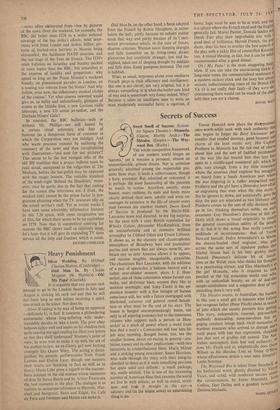Secrets of Success
THE whole competitive framework of our modern world hinges on 'success,' yet it remains a personal, almost an unmentionable, private dream. Nor is ambition generally admitted among the respectable pas- sions these days; it leads a subterranean, though a busy, existence. But, admitted or concealed, it is perhaps the most fascinating of the passions to watch in action. American society, more honest, more ruthless, its ends and limits more clearly defined than ours, admits and even en- courages its existence in the life of almost every man (women are another matter). Sweet Smell of Success is produced by the Hecht-Hill- Lancaster team and directed, to my big surprise, by the man with a cosy British reputation for Whisky Galore, Alexander MacKendrick, from an uncomfortable and at moments brilliant screenplay by Clifford Odds and Ernest Lehman. It shows us, in the clammy and claustrophobic atmosphere of Broadway bars and journalists' parties and streets that are always neon-lit, am- bition raw as only America allows it to appear, and success tangible, recognisable, accessible. The chameleon Burt Lancaster, with the addition of a pair of spectacles, a hideous haircut and a rather over-sinister manner, plays J. J. Hun- seeker, one of those columnists whose favour can make, and disfavour blast, anyone they like to mention overnight; and Tony Curtis is his ap- prentice monster with a few twinges of human conscience still, but with a future mortgaged with blackmail, calumny and general moral beastli- ness to what must be the end of his days. The lesson is banged uncompromisingly home, not only to all aspiring monsters but to the innocuous citizens who support such a person as Hun- seeker at a pitch of power where a word from him that a man's a Communist will lose him his job next morning. Banged home, too, are the smaller lessons about rat-racing in general—am- bition, money and its other implications—with two innocents to counterbalance them, Marty Milner and a striking youag newcomer, Susan Harrison, who walk through the story with their integrity clutched to them as if it were something precious but quite solid and definite: a small package, say, easily mislaid. This is one of the increasing number of American films that examine the world we live in with artistic, as well as moral, strict- ness and loaok it straight in the eye--a salutary and (in the widest sense) an entertaining thing to du. Trevor Howard now plays the disattpointed, once-worth-while soak with such authority thal one begins to forget his Brief Encounter Per; sonality that exuded decency, good humour aria charm of the least exotic sort. His Captain Prothero in Manuela has the tail end of char' about him and the sort of frAdled puzzlement at the way life has treated him that lays biro open to a middle-aged emotional jolt, which he gets, sure enough, from a fey little stowawaY whom the amorous chief engineer has smuggled on board from a South American port where she was lingering in a rather unsprrified WO' Prothero and the girl have a three-day love affair so engrossing that even when the ship starts a fire he ignores it; down, not unnaturally, goes the ship, the pair are separated in two lifeboats and Prothero comes to the sort of silly decision Men go in for, thinking themselves noble, on such occasions. Guy Hamilton's direction of this Lin' likely idyll shows a visual originality to matell the general cosmopolitan oddity of the people in it; but it is the acting that really covers 3 multitude of inconsistencies: that of Trevnr Howard himself; Pedro Armcndariz's as Marin, the shaven-headed chief engineer, who Pots, across the same sort of repulsive pathos Lila' Michel Simon had in his best grubby daYs; Donald Pleasance's delicate bit of fanali' cism as the Welsh mate who thinks his thoughts in .a penetrating silence; and Elsa Martinelli's as the girl Manucla, who is required to Wit puzzled at the big masculine world and Who' with an outlandish beauty, an air of doll-like simple-mindedness and a suggestive deal of We' stretching, does it very well. The Shiralee means, in Australian, the burden, in this case a small girl in trousers who folloWs her swagman father (Peter Finch) about in search of jobs which she mostly prevents him getting' , This wary, independent, raucous, gap-toothed' endlessly demanding, none-too-clean but ell; gaging creature brings back vivid memories 0,1 wartime evacuees who arrived to disrupt ones rural peace with just that expression, clutching just that sort of grubby felt animal. The tralian atmosphere feels fine and authentic; sd does Mr. Finch and so, emphatically does Dana Wilson as his shiralee. Less so Tessie O'Shea, whose effusiveness strikes a sour note. Director: ' Leslie Norman.
The Wayward Bus is taken from Steinbeck his hackneyed worst, glumly directed by Viet°rr Vicas, and acted, with moderate success nodes the circumstances, by Jayne Mansfield, J°a Collins, Dan Dailey and a goodish newconler, Dolores Michaels.
ISABEL QUIGLI






























 Previous page
Previous page